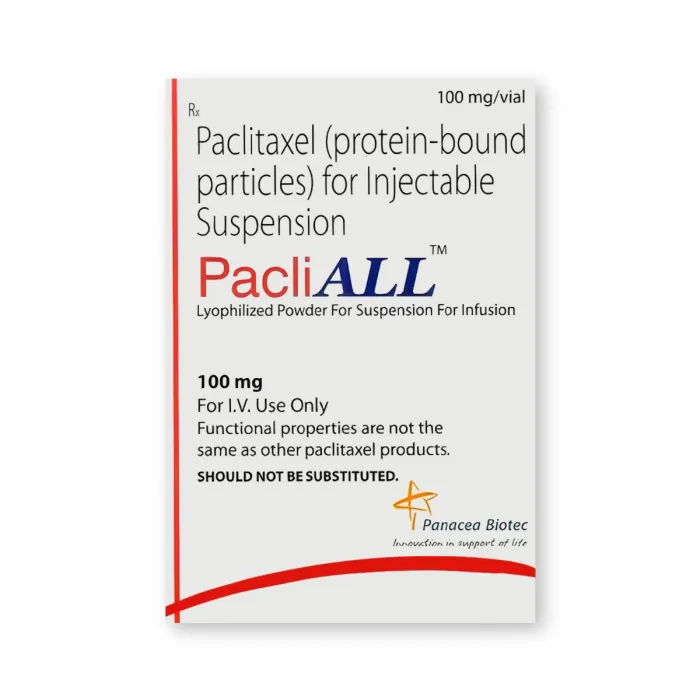What is Pacliall 100 mg
Pacliall 100 mg is a potent anticancer medication used primarily to treat various cancers. It belongs to the class of drugs called Taxanes, which are crucial in Cancer therapy. The active ingredient in Pacliall is Paclitaxel, a well-known tumor growth inhibitor. This medication is administered as an intravenous infusion, making it a Cancer treatment infusion.
M/s Panacea Biotec manufactures Pacliall. The company ensures that its products, including Pacliall 100 mg, adhere to high-quality standards. The salts in their medication are FDA-approved, and their medications are GMP-compliant and WHO-approved, ensuring trustworthiness and safety for users.
Paclitaxel 100 mg is used in Ovarian Cancer, Non-Small Cell Lung Cancer (NSCLC), and Breast Cancer therapy. It disrupts the microtubules in Cancer cells, inhibiting their growth and multiplication. This mechanism makes Pacliall an effective chemotherapy drug for managing these Cancers.
What are the benefits of taking Pacliall 100 mg
Pacliall 100 mg benefits individuals by effectively treating Cancers such as Breast, Ovarian, and Non-Small Cell Lung Cancer (NSCLC) by blocking tumor growth. It is a versatile option, working alone or combined with other chemotherapy treatments to enhance treatment outcomes. The active component, Paclitaxel, disrupts microtubules, which deters Cancer cells from dividing and multiplying. It is a vital part of Cancer therapy.
Therefore, the primary Pacliall 100 mg uses are treating the following:
- Breast Cancer: Pacliall is used to treat Breast Cancer, often as part of a combination therapy.
- Ovarian Cancer: It is used to manage Ovarian Cancer, mainly when other treatments are insufficient.
- Non-Small Cell Lung Cancer: Paclitaxel 100 mg treats NSCLC, especially when surgery or radiation is unsuitable.
- Pancreatic Cancer: It helps control Pancreatic Cancer and relieve symptoms like lack of appetite or unexplained weight loss.
- AIDS-Related Kaposi’s Sarcoma: Pacliall is also used to manage this condition when other treatments are ineffective.
How to take Pacliall 100 mg
Before taking Pacliall 100 mg dosages, consult an Oncologist. Here are some guidelines:
- The timing of administration is usually scheduled based on the treatment plan and the individual's condition. It is often given over 3 hours.
- Paclitaxel 100 mg is administered intravenously by a healthcare professional.
- It should not be self-administered. The Pacliall dosage is determined based on the individual's condition and body weight.
- It is typically given every 3 weeks, depending on the treatment plan.
Strengths and Substitutes
Pacliall is typically available only in 100 mg/vial pack. However, you will get other Paclitaxel at the Cheap Medicine Shop:
| $247.50/unit | |
| $214.50/unit | |
|
$297.00/unit |
What are the side effects of Pacliall 100 mg
Mild side effects often subside as the body adjusts. Common Pacliall 100 mg side effects include:
- Diarrhea
- Nausea and vomiting
- Hair loss
- Fatigue
- Mouth sores
- Infections
- Allergic reactions
Safety Advice
![]() Liver disease
Liver disease
Paclitaxel 100 mg should be used cautiously in people with liver disease, as it may affect liver function. Dose adjustments may be necessary to control excessive toxicity. For severe liver impairment, Paclitaxel should be used with extreme caution or avoided altogether if possible.
![]() Kidney impairment
Kidney impairment
While the kidneys do not primarily metabolize Pacliall, individuals with severe kidney impairment should consult their doctor. Doctors may need to monitor kidney function closely and adjust the dosage or treatment plan if necessary to ensure safety and effectiveness for those with severe kidney impairment.
![]() Pregnant and breastfeeding women
Pregnant and breastfeeding women
Paclitaxel is not recommended during pregnancy or nursing due to potential danger to the fetus or baby. Females of childbearing potential should avoid pregnancy while receiving this medication and for at least 6 months after treatment. Paclitaxel is excreted into animal milk and likely to be in human milk. This poses a risk to the baby.
![]() Avoid
Avoid
Avoid if allergic to Paclitaxel or Polyoxyethylated castor oil. Avoid excessive alcohol consumption during treatment. Inform your doctor about any treatments or supplements you take to avoid interactions.
FAQs
What should I avoid while taking Pacliall 100 mg?
When taking Pacliall, avoid driving or using heavy machinery because it can affect your concentration and alertness. Do not take it if you are expecting a baby or nursing, as it can harm the baby. Also, avoid alcohol to prevent dizziness and other side effects.
How often should I get blood checks while on Pacliall 100 mg?
You should get regular blood checks while taking Pacliall 100. This helps your doctor monitor your blood cells and liver function. Depending on your health and treatment plan, they will decide how often you need these checks.
What precautions should I take before starting Pacliall 100 mg?
Before starting Pacliall, tell your doctor about any medicines you're taking. Avoid alcohol, and don't drive if you feel unwell. If you're pregnant or breastfeeding, inform your doctor. Also, let them know if you have liver or heart issues. Always follow your doctor's advice.
How does Pacliall 100 mg compare to other Cancer medications?
Pacliall is a strong Cancer medicine that helps treat Breast, Ovarian, and Lung Cancers. It works like other Cancer medicines by stopping Cancer cells from growing. You might use it alone or with other treatments. It's similar to other medications like Pacliwel, but always talk to your doctor about which is best for you.
Are there any dietary restrictions while taking Pacliall 100 mg?
When taking Pacliall 100, you should avoid eating rich or spicy food. It's best to eat simple meals. Also, try to have the injection with or just after a meal or snack. Avoid alcohol and certain foods like grapefruit, as they can affect the medicine's effectiveness.
